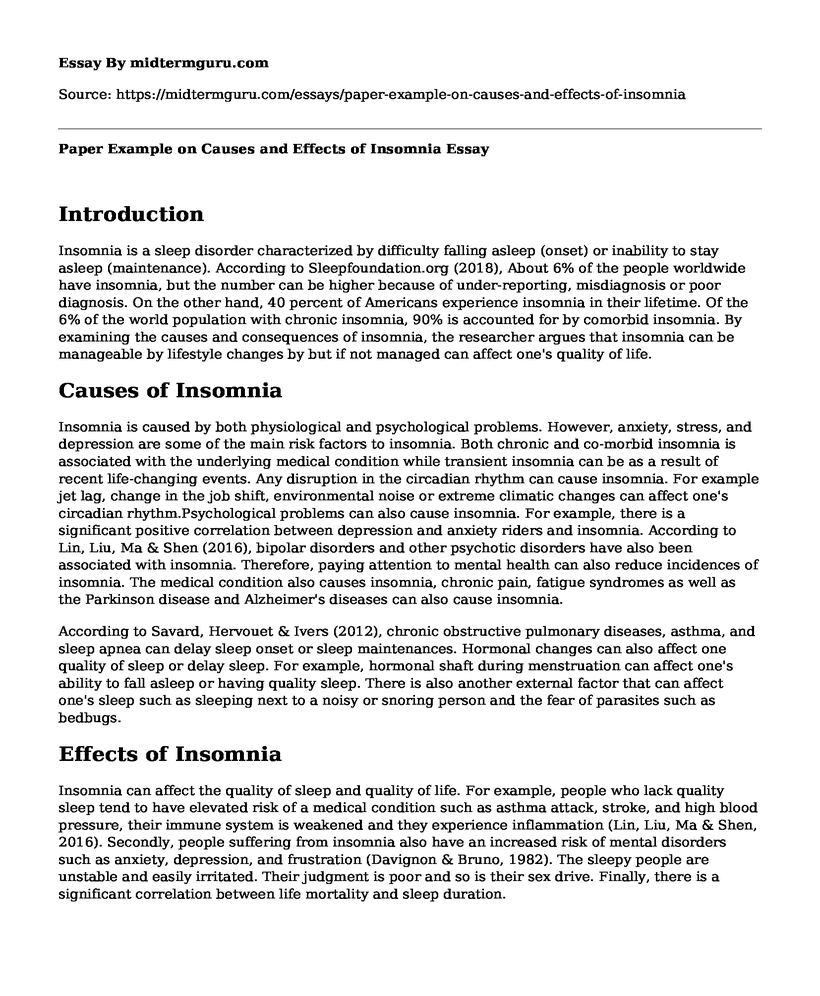Introduction
Insomnia is a sleep disorder characterized by difficulty falling asleep (onset) or inability to stay asleep (maintenance). According to Sleepfoundation.org (2018), About 6% of the people worldwide have insomnia, but the number can be higher because of under-reporting, misdiagnosis or poor diagnosis. On the other hand, 40 percent of Americans experience insomnia in their lifetime. Of the 6% of the world population with chronic insomnia, 90% is accounted for by comorbid insomnia. By examining the causes and consequences of insomnia, the researcher argues that insomnia can be manageable by lifestyle changes by but if not managed can affect one's quality of life.
Causes of Insomnia
Insomnia is caused by both physiological and psychological problems. However, anxiety, stress, and depression are some of the main risk factors to insomnia. Both chronic and co-morbid insomnia is associated with the underlying medical condition while transient insomnia can be as a result of recent life-changing events. Any disruption in the circadian rhythm can cause insomnia. For example jet lag, change in the job shift, environmental noise or extreme climatic changes can affect one's circadian rhythm.Psychological problems can also cause insomnia. For example, there is a significant positive correlation between depression and anxiety riders and insomnia. According to Lin, Liu, Ma & Shen (2016), bipolar disorders and other psychotic disorders have also been associated with insomnia. Therefore, paying attention to mental health can also reduce incidences of insomnia. The medical condition also causes insomnia, chronic pain, fatigue syndromes as well as the Parkinson disease and Alzheimer's diseases can also cause insomnia.
According to Savard, Hervouet & Ivers (2012), chronic obstructive pulmonary diseases, asthma, and sleep apnea can delay sleep onset or sleep maintenances. Hormonal changes can also affect one quality of sleep or delay sleep. For example, hormonal shaft during menstruation can affect one's ability to fall asleep or having quality sleep. There is also another external factor that can affect one's sleep such as sleeping next to a noisy or snoring person and the fear of parasites such as bedbugs.
Effects of Insomnia
Insomnia can affect the quality of sleep and quality of life. For example, people who lack quality sleep tend to have elevated risk of a medical condition such as asthma attack, stroke, and high blood pressure, their immune system is weakened and they experience inflammation (Lin, Liu, Ma & Shen, 2016). Secondly, people suffering from insomnia also have an increased risk of mental disorders such as anxiety, depression, and frustration (Davignon & Bruno, 1982). The sleepy people are unstable and easily irritated. Their judgment is poor and so is their sex drive. Finally, there is a significant correlation between life mortality and sleep duration.
Conclusion
Insomnia is caused by a wide range of health issues, psychological problems, and disruption in the circadian rhythm. Never the less, insomnia is prevalent in the world as over 6% of the world population has insomnia. Insomnia should be managed failure to which one's risk of psychological problems and medical conditions that can ensue. Asthma and depression are some of the most notable effects of insomnia not to mention the poor quality of life, anxiety, and agitation.
References
Davignon, D., & Bruno, P. (1982). Insomnia: Causes and Treatment, Particularly in the Elderly. Journal Of Gerontological Nursing, 8(6), 333-336. Doi: 10.3928/0098-9134-19820601-06
Lin, Y., Liu, Z., Ma, W., & Shen, W. (2016). Hazards of insomnia and the effects of acupuncture treatment on insomnia. Journal Of Integrative Medicine, 14(3), 174-186. Doi: 10.1016/s2095-4964(16)60248-0
Savard, J., Hervouet, S., & Ivers, H. (2012). Prostate cancer treatments and their side effects are associated with increased insomnia. Psycho-Oncology, 22(6), 1381-1388. Doi: 10.1002/pon.3150
Sleepfoundation.org. (2018). What Causes Insomnia?. Retrieved from https://www.sleepfoundation.org/insomnia/content/what-causes-insomnia
Cite this page
Paper Example on Causes and Effects of Insomnia. (2022, Sep 19). Retrieved from https://midtermguru.com/essays/paper-example-on-causes-and-effects-of-insomnia
If you are the original author of this essay and no longer wish to have it published on the midtermguru.com website, please click below to request its removal:
- Humanitarian Assistance: Research Proposal
- Essay Saple on Organ Selling
- Japanese Maternity Culture - Essay Sample
- Exploring Diabetes as a Chronic Disease - Essay Sample
- Inclusive Healthcare for Vulnerable Populations in Hospital - Essay Sample
- Sinusitis: Understanding the Inflammation of the Sinuses - Essay Sample
- Living a Healthy Lifestyle: A Necessity for a Healthy Life - Essay Sample







